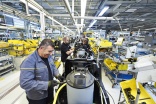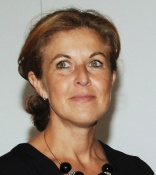Home › magazine › october 2014 › latest news › Sustainable cleaning the people element
Sustainable cleaning - the people element
5th of November 2014Providing an attractive work environment is a key part of any sustainability policy since it supports the ‘people’ part of the ‘People, Planet, Profit’ equation. Ann Laffeaty asks companies in the cleaning sector what they are doing to keep their staff safe, healthy and happy – and how they are helping people in the wider community.
The term ‘sustainability’ used to be more or less a synonym for ‘environmentally-friendly’ which basically meant looking after the planet. But nowadays, the three planks of sustainability are considered to be ‘People, Planet, Profit’ which means it is equally important to take into account the needs of staff and the wider community while also ensuring that the company can sustain itself financially.
Manufacturers of cleaning machines and equipment need to minimise the number of accidents in the workplace, for example, to keep their employees safe. If they offer enhancements such as flexible working terms and employee incentives, this will also help to improve staff morale and wellbeing. And a growing number of companies today are becoming involved in local or global charitable schemes in order to give something back to the community.
Sealed Air is committed to providing a good place to work according to Diversey Care global marketing director Irina Klemps. “Our commitment takes many forms,” she said. “This ranges from our emphasis on employee safety and the sustainability of our offices, to the recognition we bestow on our people and the opportunities we provide for individual growth and career development.”
According to Klemps, every employee plays a part in contributing to the company’s success. “This is why the health and safety of all of our colleagues around the world is so important,” she said. ”Safety is not just a metric at Sealed Air, it is a mind-set.”
She says Diversey Care prevents workplace accidents by recognising unsafe behaviour and identifying risks before injuries can occur. “In all areas of our business, collaboration and communication are vital since we share ideas and learn from each other to prevent future accidents,” she said.
“For example, our health and safety team recognised that 25 per cent of total injuries at our work sites involve hands and fingers. We now require all employees performing cutting tasks to wear glove protection and to use blunt-tip scissors or safety knives. Our goal is simple: every employee goes home in the same condition in which they arrived at work.”
Healthy and safe
She says the company also works hard to ensure that cleaners and other people using the company’s machines and systems stay healthy and safe. “We train our users constantly to prevent misuse or potential dangers, and our tools and machines are innovated in a way to be ergonomic and easy to use, preventing fatigue or injuries,” she said. “Moreover our chemical platforms are designed to eliminate any contact between cleaners and highly concentrated products.”
According to Klemps, Diversey Care regards its people as the company’s most important asset. “They provide the competitive edge we need to meet the challenges of today’s fast-paced, global economy,” she said. “For that reason we are determined to attract and retain the best people and our values are part of that equation. So, too, is our focus on assuring that every employee with the willingness to make the effort has the opportunities and receives the training they need to take on additional responsibilities and to advance their career.
“We also understand work accounts for only one part of a person’s life, and are mindful of the obligation we have to create the right balance between personal and professional lives.”
Diversey Care also supports communities globally in various ways. “This ranges from providing disaster relief and organising food drives to enhancing the educational opportunities of children in some of the most distressed places on earth,” she said. “Importantly, our employees are empowered to take the initiative in determining how best to support their local communities.
“For example through an employee-sponsored programme in Vietnam called Helmets for Kids, we provide motorcycle helmets to children at a school that lacks resources. The programme, now in its sixth year, has already saved 25 children from serious head injuries.”
According to Bio-Productions managing director Mike James, the safety of staff and end-users is the company’s overriding concern when producing and supplying cleaning products. “To this end we have created alternative formulations to some of the more ‘conventional’ cleaning products which offer efficacy with less risk,” he said.
“We have spent a lot of effort looking for other ways of resolving cleaning problems and over the years we have developed a number of ‘firsts’ – some of which have been adopted by our competitors. Our non-pDCB urinal blocks are a good example. We spent four years developing an alternative to the traditional carcinogenic ‘pineapple chunks’ and came up with a biological and chemical replacement which is not only considerably safer to use, but that also removes the cause of the odour problems that pDCB was only masking.”
According to James the company supports the wider community by funding a different charity each year, and also looks after its employees in other ways. “We are compassionate and flexible about our working hours, and we operate a profit share so that everyone benefits when we make a profit,” he said.
“We look at our employees as helpers. They ‘sell’ us their time and efforts and we try to make their working life as enjoyable and stress-free as possible. Obviously we also take their welfare seriously and ensure that the facility is a safe and pleasant place in which to work.” He says such an attitude has benefits for employees and for the company itself.
“If the workforce is content with their employment, their conditions and their colleagues, this manifests itself in their productivity and their willingness to step in where they can help out.”
Hako’s head of human resources Gabriele Bach agrees with this ethos. “It is part of our company philosophy to ensure and promote the safety and health of our employees,” she said. “Providing good leadership and creating a good working atmosphere is an important element in motivating employees, and this ultimately contributes to the company’s success.”
Hako offers various support options for staff such as apprenticeship training and further educational opportunities. “We also have our own training academy and offer flexible working hours and a comprehensive range of health-promoting and team-building company sports activities,” she said.
Minimal environmental effect
Safety is an important part of Hako’s ethos. “We design our processes to ensure people’s health and safety are a priority wherever economically feasible, and that environmental effects are kept to a minimum,” said Bach. “But safety can only be ensured if operators follow instructions. Not using gloves when working with chemicals can result in damaging the skin, for example. Most accidents can be attributed to human error.”
Around 50 per cent of Hako’s total workforce is made up of employees with disabilities. “People with clinical conditions and disabilities work together with their healthy colleagues in metal processing, industrial assembly and logistics in a very successful manner,” she said.
Kärcher’s environmental matters public relations officer Linda Schrödter also claims happy and healthy staff to be the key to a company’s success.
“Sustainability is not an end in itself, but has tangible economic advantages,” she says. “The logic is simple: when a company provides good working conditions, this reduces the sickness absence rate and when a machine is made to work more efficiently, it saves energy and money.”
Motivation and efficiency
She says Kärcher offers an extensive health programme with company sports activities, campaign days and training seminars for employees. “This does not only benefit employees in terms of health, motivation and efficiency, it also enhances the attractiveness of a cleaning machine manufacturer as an employer.”
She says Kärcher offers various part-time opportunities including flexible working hours and holiday programmes for the children of employees. “The company also pays a subsidy for childcare, and we plan to provide working parents with even more support in future,” she said. “For example there will be more options to work from home and part-time careers will be introduced.”
She adds that safety plays an important role in the development and use of the company’s products. “Injuries to cleaning staff always result in downtime for the cleaning company and this costs money. We have high quality, certified suppliers and internal Kärcher standards for using safe materials. We also carry out regular material audits.” She says product features such as detergent dosing and adjustable brush speed and contact pressure help to ensure the safety of the user.
Kärcher supports a number of projects worldwide and received 1,600 requests for help in 2013 alone. “All were individually answered and we sponsored around half,” she said. “In Brazil, for example, Kärcher donates electrical equipment to communities. Meanwhile our employees there are offered sports programme and vaccinations in the workplace.”
Nilfisk-Advance business development manager Emmet Sharghbin says staff health and safety is an important part of his company’s sustainability strategy. “All our managers and employees are aware of the importance of prioritising health and safety issues, both in our plants and in our sales teams,” he said. “Globally, all accidents and resulting absence days are reported so that we can track and learn from every accident. This information is also published quarterly on our intranet so that everyone is aware of it.
“In this way we have driven down the number of accidents and will continue to do so. We are not at zero yet, but will strive to get there by continually focusing on this important area.”
He says Nilfisk also works hard to boost employee satisfaction. “This we achieve by offering flexible hours and the opportunity to take leaves of absence along with other incentives,” said Sharghbin.
He says one of the key responsibilities of each site manager is to ensure all machinery is always safe to use. “This is monitored globally via our accident reporting system,” he said. “If there were any discrepancies there would be swift follow-ups. Numbers of these have been declining so we see a positive trend.”
Sharghbin adds the company has instigated a number of schemes to aid local communities. “These include agreements with universities to host trainee students; donations of machines to schools and hospitals to ensure cleaner environments, and volunteering at charitable organisations,” he said. “Our employees are very creative in finding good causes to support and we are happy to see them giving something back to our communities.”
He believes that any company’s sustainability policy is founded in its employees. “If they do not consider their own jobs to be sustainable and are not happy or healthy, it is impossible to achieve any sustainability results. Therefore it is extremely important for us to keep our staff happy, safe, and healthy.”
However, he admits that such a measure can be costly in the short-term. “But we know our investment in the health and safety of our staff will pay off in the long-term,” he said. “And even if this were not the case we would still do it since our values and code of ethics still tell us this is the right thing to do.”










